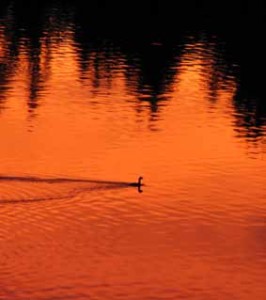 Tips for Keeping Your Lake Healthy
Tips for Keeping Your Lake Healthy
The following text includes a variety of tips on household activities and products that will keep your rural property attractive, cared-for and won’t add to problems in the nearby lake!
Use low impact gardening and lawn care
The lush green lawn concept originated on the east coast of the U.S. where frequent summer rains kept the open spaces regularly watered and growing freely. However, in the West where we commonly have summer droughts, keeping a lawn looking good can still be accomplished by using some lake-friendly practices. With some simple techniques, you can be well on your way to a healthier garden and lawn, while reducing your impact on Lake Marcel. Here are some tips to get you started:
- Reduce the size of your lawn to the area you actually use frequently and replace the turf with native plants that provide habitat for wildlife and make landscape pictures for you to enjoy year-round from the house, as well as the street. A good resource for learning about native plants can be accessed online at http://green.kingcounty.gov/GoNative/Index.aspx.
- Add pavers. Make your garden look designer-perfect by installing paver steps and grasscrete instead of solid concrete or asphalt driveways and walks. Edging of flower beds with cobble or untreated wood and fences of natural materials can finish the look and fit in with the charm of the rural neighborhood.
- Plant native plants as shoreline buffers to help filter pollutants in stormwater such as lawn fertilizer.
- Install a rain garden. If you have a low spot on your property, consider installing a rain garden—an area that is designed and planted with rain collection and percolation in mind. The soils are modified to increase rain penetration and plants are chosen with occasional standing water in mind. You can direct runoff to the spot and reduce the amount of rain that leaves your property and runs directly into the lake by creating free-flow, ditches or pipes. Information on rain gardens in the northwest can be found at http://www.pierce.wsu.edu/Lid/index.html.
- Only water once a week. If you water, do it thoroughly and only once a week. Place tuna cans here and there in the sprinkler range and continue watering until an inch of water has collected in the cans. This will also let you know if your sprinkler is applying the water evenly over the lawn area; you can make adjustments if it is spotty and places are being missed.
- Improve lawns with aeration and overseeding in the fall or spring. Aeration gets needed oxygen to the roots of the grass and increases water penetration. Thick turf behaves like an impervious surface and can actually prevent water from
percolating downward. Aerating will help compensate for this and will encourage healthy root growth, which will make grass less dependent on summer watering. Overseeding will reduce bare patches and replace older grasses that have stopped growing well. Doing this during seasons when there is more rain and mild temperatures will encourage new grasses to sprout and grow. - Become a “grasscycler” by setting your mower on “high” and leaving those grass clippings behind, which as they dry and shrivel will settle between the growing blades and will decompose to recycle nutrients back to your lawn. Mulching mowers work best for this, because they shred the clippings into very small pieces that compost in place.
- Use low or no phosphorus fertilizer on your lawn. Most soils in the Pacific Northwest have sufficient phosphorus already present and do not need any more applied. Excess phosphorus will run off the lawn with watering and will drain into Lake Marcel. Nitrogen is the nutrient most needed by grass in our area for a good green color and healthy growth, and luckily, it is usually available in excess in fresh water bodies here, so more added to the lake will not have such major impact. You can always get your soil tested to determine if you need phosphorus.
- Apply fertilizer sparingly. If a soil test determines you need to fertilize, apply it moderately in September and May and use natural organic or slow release fertilizers – these will provide small steady doses of nutrients as grasses need them, during the periods for best growth.
- Sweep up any fertilizer that has spilled on hard surfaces such as walks and driveways. Otherwise, the nutrients (especially the phosphorus) will be carried by water directly to the lake and give the algae a meal.
- Use pesticides and herbicides only as a last resort:
- Read labels carefully; most will specify use restrictions for waterfront areas because of their potential harm to nearby fish and wildlife.
- Do not apply pesticides when it is windy to avoid the possibility of it drifting off your target and landing where it
can cause harm. - Use the least toxic and most readily degradable pesticide – those with “caution” on the label are considered least toxic whereas the word “warning” indicates moderate toxicity.
- Purchase only what you need to control the problem for the current season; it’s not good to store pesticides long term and accidents can happen.
- Dispose of pesticides properly – make sure to take them to a household hazardous waste drop-off site, like the Wastemobile or the nearest King County hazardous waste collection location.
For more information, go to http://your.kingcounty.gov/solidwaste/naturalyardcare/lawncare.asp.